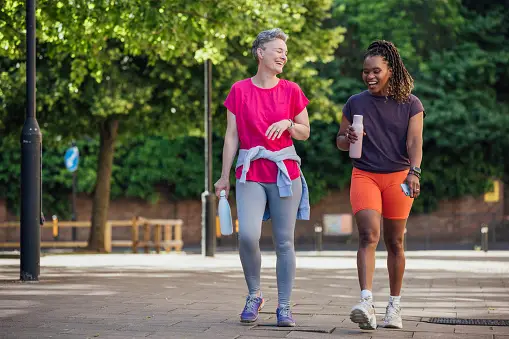Go for a 22-minute stroll consistently — it could counterbalance the wellbeing dangers of sitting the entire day at your work area, researchers say
 |
- Being inactive, or sitting at least 10 hours every day, is connected a higher gamble of kicking the bucket early.
- New exploration proposes exercise can diminish the gamble in just 20 minutes per day.
- Energetic strolling, family errands, and using the stairwell all count toward your day to day complete.
A fast activity break might assist with counterbalancing the possibly destructive outcomes of sitting the entire day, new exploration recommends.
While a stationary way of life — sitting for at least 10 hours every day — is connected to higher chances of early demise, just 20 to 25 minutes might relieve the gamble, as per a review distributed October 24 in the English Diary of Sports Medication.
Scientists from various colleges, remembering the College of Tromsø for Norway and Aarhus College in Denmark, took a gander at information from 12,000 grown-ups matured 50 and more seasoned from Norway and Sweden. They contrasted their action levels with wellbeing results to see whether exercise could have an effect in a generally stationary way of life.
They found that members who routinely sat for over 12 hours daily had a 38% higher possibility passing on right on time.
In any case, that wellbeing risk was alleviated assuming members figured out how to time somewhere around 22 minutes of moderate to energetic action every day, from exercises like lively strolling, light climbing or trekking, or family errands.
The discoveries add to a developing collection of proof that short explosions of heart-siphoning activity can assist with counterbalancing the serious wellbeing dangers of sitting day in and day out.
More activity is connected to more medical advantages
The scientists figured out that rising opportunity spent practicing was connected to an undeniably lower chance of death, paying little heed to how long a day individuals spent sitting.
That is steady with an abundance of past proof that recommends practice is perfect for wellbeing, with benefits like better state of mind, more energy, and lower hazard of sicknesses like coronary illness and disease.
Yet, for additional inactive individuals, greater development appeared to have more critical medical advantages. For example, an additional 10 minutes per day of activity was connected to 15% lower hazard of death for individuals who sat under 10 hours every day. For individuals who were more inactive, sitting something like 10 and a half hours daily, similar 10 minutes of activity was connected to 35% lower chance of death.
Past examination has additionally found little dosages of activity can have large advantages. A review distributed in February found that just 11 minutes of activity each day was connected to bring down chance of early demise.
Getting your pulse up can help your wellbeing
Moderate activity is regularly characterized as exercises that raise your pulse yet permits you to convey a discussion, including an energetic walk, bicycle ride, or even a meeting of playing with children or pets. Vivacious action incorporates things like climbing, using the stairwell, or conveying weighty food.
Proof recommends a touch of power can assist you with making the most out of short explosions of activity by getting your heart siphoning and your muscles working.



